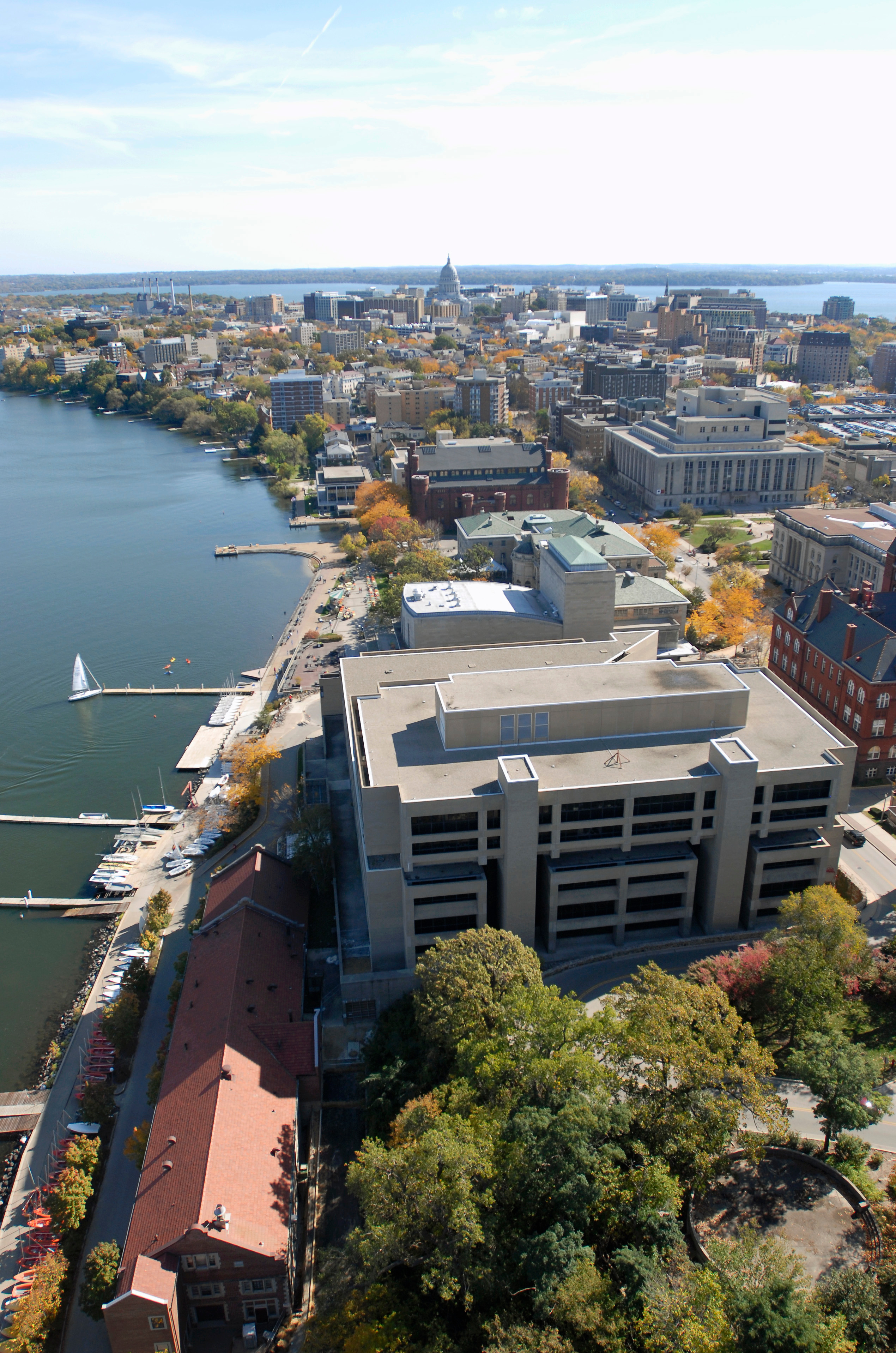Why Are We Here?
Fifty Years of Helencistic Philosophy

The new building at 600 North Park Street was to be crowned with a two-story tower equipped with a faculty club, bar included. There was to be an overhead walkway extending from the building’s third floor across Observatory Drive to Bascom Hill, allowing faculty expeditious and weather-resistant access to their classes. The building was to be an impressive structure, a major improvement over the site’s previous occupants—the old chemistry and engineering buildings—which threatened to catch fire at inopportune times.
This year marks the 50th anniversary of the philosophy department’s move to Helen C. White, which opened in the summer of 1971. Philosophy at UW-Madison had previously resided for over 100 years in Bascom Hall. The decision to move was made in the mid-1960’s by the then-chair, Prof. Marcus Singer, who has left us with a detailed history of the department, including the circumstances leading up to the move.
While the new building’s promised amenities were a selling point, what proved decisive for Singer was the simple fact that Bascom Hall was no longer a tenable home. The sixties were a period of unprecedented expansion for philosophy. When the decision to move was made, there were 32 regular faculty members and over 100 graduate students. There was not sufficient space to house them all in Bascom Hall, nor to meet the department’s equipment needs. Some faculty and graduate students had been exiled to other buildings around campus. Those located in Bascom were crowded together in small offices, in conditions not entirely dissimilar to a 19th century tenement. Among the building’s (supposedly irremediable) shortcomings was a dearth of elevators, which presented challenges especially for older faculty. (Singer cheekily observes that once Bascom Hall became home to university administrators its shortcomings suddenly proved quite tractable—the impossible proved possible after all: a lesson for philosophers.)
During the planning phase for the move, Singer appointed philosophy professor Fred Dretske, who happened to also have an engineering degree, as his “deputy on space.” Singer and Dretske were involved in final decisions about office layout and furniture. Defending their choices, Singer writes: “you should have seen the alternatives.” Like Leibniz’s God they had to select the best among the limited possibilities presented to them.
Those who have been to Helen C. White may have noticed that some of the planned amenities never materialized. One seeks in vain a faculty club with bar on the top floor. Ditto for the overhead walkway, though one can at least still find the conditions of its possibility on the third floor, in the form of a large idiosyncratic outside area at the top of the stairs—a site once colorfully dubbed “Mussolini’s Balcony” and now a favorite spot for the building’s smokers. These and other promising (and promised) amenities were casualities of budgetary, logistical, administrative, and political considerations.
For a time, the name of the new building at 600 North Park was up in the air. Some members of the department lobbied to have it named after the famous UW-Madison philosopher, Max Otto. But in the end it was named in honor of Helen Constance White, a beloved, much-published UW-English professor who had died in 1967 and who had been given the sobriquet “the Purple Goddess,” because of her stature and sartorial choices.
In its early days at Helen C. White, the philosophy department occupied almost all of the fifth and fourth floors of the building. Much of the space in 5185 HCW was taken up by the department’s first word processor, affectionately dubbed “the Monster.” Contractions in equipment and personnel size, along with what Singer describes as unreciprocated land-grants by subsequent chairs (read: giving away of space), led to philosophy’s current situation. For the time being, philosophers coexist on the fifth floor of HCW with our colleagues in ESL. 5185 HCW is no longer a place for monsters but instead for the department administrative staff; the department chair; and the assistant to the chair.
Helen C. White is not the philosophical paradise it might have been. In Buildings of the University of Wisconsin Madison, Jim Feldman writes: “The appearance of the building, in and out, is consistent with the standard set by the humanities building for plainness and lack of ornamentation.” But it has some definite advantages, including wonderful views of the lake, a (modestly sized) parking garage, and convenient access to the Memorial Union terrace. While there is no tower and no bar, Helen C. White has been a reliable home for the philosophy department for the past fifty years. Its walls have witnessed exciting developments, including such philosophical achievements as the demolition of numerous untenable interpretations of Kant. It is, at this point, home.
Marcus Singer
While we remember the fiftieth anniversary of the philosophy department’s move to Helen C. White, it is a fitting time to pay tribute to Marcus Singer, who played an integral role in the move and who has left us with a rich and colorful account of the department’s history. (I drew on this heavily for “Why Are We Here: Fifty Years of Helencistic Philosophy.”)
Professor Marcus Singer (1926-2016) earned his PhD in philosophy from Cornell University in 1952, and then joined UW-Madison’s philosophy department, where he worked until his retirement in 1999. Singer advanced the field of ethics with publications like Generalization in Ethics – An Essay in the Logic of Ethics, with the Rudiments of a System of Moral Philosophy. He earned many honors and accolades throughout his distinguished career. He was a committed teacher, described by one grateful student as among “the most influential and life-changing person[s]” in his life. During his long career, Singer shouldered numerous professional responsibilities, including a stint as President of the APA Central Division (1985-6) and chairmanship of the UW-Madison philosophy department (1963-1968).

Singer was the department chair during challenging times. This was a period of unprecedented growth, when many new faculty members were hired (which was one of the reasons for the move to Helen C. White). It was also a time of political and cultural tumult when a number of dramatic events on campus unfolded, including the rise of the TAA and the Battle of the Commerce Building, which took place on October 18, 1967, and which was “the first time tear gas was used to disperse a crowd on the UW–Madison campus.”
The department owes Singer a lot – for his leadership during hard times; his meticulous documentation of departmental and university history; and (along with his wife, Blanche), for the Marcus G. and Blanche L. Singer Graduate Fellowship, to name just a few things.
While Singer passed in 2016, his memory lives on, as does his writing, and even his voice. Readers are advised to listen to some of the recorded interviews that were done with Singer as part of the University of Wisconsin-Madison Oral History Program (available through the UW-Madison library), wherein Singer can be heard discussing, among other things, the anti-war movement on campus; the bombing of Sterling Hall; and the politics of the philosophy department during the 1970’s.